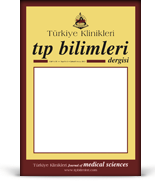Amaç: Ailevi Akdeniz Ateşi (FMF) ile ilişkili MEFV gen mutasyonlarının Behçet hastalığı, romatoid artrit ve inflamatuar barsak hastalığı gibi diğer sistemik inflamatuar hastalıklarda da sıklığının arttığı ve bazı klinik bulgular ile ilişkili olduğu bildirilmiştir. Literatürde MEFV mutasyonlarının ankilozan spondilitte (AS) de arttığına dair gözlemler bulunmaktadır. Bu araştırmada kendi kohortumuzdaki AS hastalarında MEFV gen mutasyon sıklığının; hastalık şiddeti ve radyolojik hasar ile ilişkisi değerlendirildi. Gereç ve Yöntemler: Çalışmaya yeniden düzenlenen Tel Hashomer kriterlerine göre FMF kliniği olmayan ve yeniden düzenlenen New York kriterlerine göre AS tanılı 97 hasta (erkek/kadın=49/48) alındı. AS hastalarının demografik özellikleri, klinik aktiviteleri Bath Ankilozan Spondilit Akvite İndeksi (BASDAI), Bath Ankilozan Spondilit Fonksiyonellik İndeksi (BASFI), akut faz yanıtları ve radyolojik hasar dereceleri modifiye Stokes Ankilozan Spondilit Omur Skoru (mSASSS) ve Bath Ankilozan Spondilit Radyoloji İndeksi (BASRI) kullanılarak belirlendi. DNA izolasyonunu takiben MEFV geninin 10. ekzonunda bulunan üç ayrı mutasyon (M694V, M680I ve V726A) Amplifikasyon Refrakter Mutasyon Sistemi; 2. ekzonda bulunan E148Q mutasyonunun sıklığı ve gen frekansı Polimeraz Zincir Reaksiyonu-Restriksiyon Fragment Uzunluk Polimorfizm yöntemi ile araştırıldı. Sonuçlar inflamatuar hastalığı bulunmayan (diabetes mellitus, sistemik hipertansiyon, karaciğer yetmezliği gibi) 186 kişiden oluşan sağlıklı kontrol (SK) grubuyla karşılaştırıldı. Bulgular: Ortalama hastalık süresi AS hasta grubunda 12,30±7,90 yıl olarak saptandı. Hastaların %71,60'sında HLA-B27 pozitifti. Yüzde 32 hastada ise üveit hikayesi mevcuttu. AS grubunda 5 (%5,21) hastada heterozigot M694V mutasyonu, 2 (%2,51) hastada heterozigot V726A mutasyonu, 2 (%2,51) hastada heterozigot M680I mutasyonu ve 10 (%10,31) hastada heterozigot E148Q mutasyonu saptandı. Bir hastada iki mutasyon birlikteydi [E148Q/M680I birleşik (compound) heterozigot]. SK grubunda 2 kişide (%1,07) M680I heterozigot, 9 (%4,81)kişide M694V heterozigot, 6 (%3,21) kişide V726A heterozigot ve 20(%10,71) kişide E148Q heterozigot mutasyon belirlendi. Çalışılan MEFV mutasyonları AS grubunda 19 hastada saptanırken (19/97, %19,51), SK grubunda 37 kişide (37/186, %19,91) saptandı. Her iki grup arasında anlamlı fark gözlenmedi (p=0,881). Her iki grupta da homozigot mutasyona rastlanmadı. Sık olan E148Q dışlandığında yine gruplar arası farklılık yoktu (AS: %8,20; SK: % 9,10; p=1). Mutasyonu pozitif saptanan ve saptanmayan grupların üveit sıklığı, HLA B27 pozitifliği, BASDAI ve BASFI skorları benzer bulundu. Mutasyon varlığının radyolojik hasarla ilişkisi olmadığı gözlendi [mutasyon (+) ve (-) olgularda: mSASSS için 23,50 (2-72) ve 14 (1-72) (p=0,477). BASRI için 4,50 (2-12) ve 5 (2-12) (p=0,921)]. Sonuç: Çalışmamızda AS hastalarında MEFV mutasyonu sıklığında artış saptanmamıştır. Behçet hastalığı ve romatoid artrit gibi inflamatuar ve otoinflamatuar hastalıklarda daha önce MEFV mutasyonlarının varlığı hastalık şiddeti ile ilişkili olarak bildirilmesine rağmen, çalışma grubumuzda AS hastalarında MEFV mutasyon varlığı ile inflamatuar bir hastalık olan AS'nin hastalık şiddeti arasında bir ilişki belirlenmemiştir.
Anahtar Kelimeler: Spondilit, ankilozan; ailesel akdeniz ateşi
Objective: Increased frequency of Familial Mediterranean Fever (FMF)-related MEFV gene mutations and an association with a more severe disease was reported for Behçet's Disease, rheumatoid arthritis and inflammatory bowel disease. In this study, the MEFV gene mutation frequency and its effect on disease activity and radiographic severity was investigated in anklosing spondilitis (AS). Material and Methods: Ninety seven patients (male/female=49/48) diagnosed with AS according to modified New York criteria, and screened for FMF-related symptoms using the revised Tel Hashomer criteria were included in the study. Disease activity was assessed using the Bath Ankylosing Spondylitis Activity index (BASDAI), and functional loss and radiographic damage were assessed using Bath Ankylosing Spondylitis Functional Index (BASFI), Bath Ankylosing Spondylitis Radiology Index (BASRI) and the modified Stokes Ankylosing Spondylitis Spine Score (mSASSS), respectively. DNA samples were obtained from the peripheral blood. MEFV mutations of exon 10 (M694V, M680I and V726A) were identified by the Amplification Refractory Mutation System method, and the E148Q mutation in exon 2 was detected by the Polymerase Chain Reaction-Restriction Fragment Length Polymorphism method. Results from the study patients were compared with a control group (CG) of 186 patients who had non-inflammatory diseases (i.e. diabetes mellitus, primary hypertension or hyperlipidemia). Results: The mean disease duration of study patients was 12.30±7.90 years, 71.6% of them were HLA-B27 positive, and 32% of the AS patients had a history of uveitis. In AS group, M694V heterozygote mutation was found in 5 (5.21%) patients. V726A heterozygote mutation was found in 2 (2.51%) patients. M680I heterozygote mutation was found in 2 (2.51%) patients. E148Q heterozygote mutation was found in 10 (10.31%) patients. There was only one single compound heterozygote patient in the AS group carrying the E148Q/ M680I mutation. A total of 19 mutations were present in the study group (19/97, 19.51%). In the CG, a total of 37 MEFV mutations were detected (19.91%). Nine heterozygote M694V mutations (4.81%), 6 heterozygote V726A mutations (3.21%), 2 heterozygote M680I mutations (1.07%), and 20 heterozygote E148Q mutations (10.71%) were present in the CG. In whole group analysis, when compared to the CG, no statistically significant increase in MEFV mutation was detected in AS patients (p=0.881). In both groups, homozygote mutations were not found. Although E148Q mutations were excluded from both groups (AS: 8.20% vs CG: 9%; p=1) the groups were not different from each other. Disease activity and functional status, HLA-B27 status and the prevalence of uveitis did not differ between non-carriers and MEFV mutation carriers. The presence of MEFV mutations did not affect radiographic severity assessed by mSASSS and BASRI (Carriers vs. non-carriers; mSASSS 23.50 (2-72) vs 14 (1-72); p=0.477. BASRI 4.50 (2-12) vs 5 (2-12); p=0.921). Conclusion: In our study, the frequency of FMF-related MEFV gene mutations was not higher among AS patients. Although some studies reported an association between MEFV gene mutations and inflammatory and auto-inflammatory diseases like Behçet's disease and rheumatoid arthritis, our results suggested that the rate of carriers for MEFV mutations was not higher in AS, and the disease severity was not affected by their presence.
Keywords: Spondylitis, ankylosing; familial mediterranean fever







.: Process List